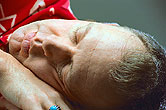
SUNDAY, Nov. 4 (HealthDay News) — People with insomnia may have double the chances of a heart attack or stroke as opposed to those who sleep well, a study by Taiwanese researchers suggests.
The finding adds to a growing body of evidence that suggests that having trouble sleeping can make you sick.
It has long been understood that health issues and sleep are often interrelated. Many studies have suggested sleep problems can cause or contribute to such physical and mental conditions as obesity, depression, high blood pressure and even memory deficits in students who burn the midnight oil.
It can also go the other way, with health issues themselves — such as pain, heartburn, hyperthyroidism, restless leg syndrome and anxiety — causing insomnia.
“We know that things that contribute to insomnia can increase heart attack risk — issues like diabetes and even stress itself,” said Dr. Gregg Fonarow, a professor of cardiovascular medicine at UCLA David Geffen School of Medicine, in Los Angeles. “We’ve seen studies about insulin sensitivity that show, for example, there can be large metabolic changes tied to wake-sleep cycles.”
For the new study, led by Dr. Chien-Yi Hsu at the Taipei Veterans General Hospital, the researchers used a nationwide heath database of 2 million people. After taking out those with depression, anxiety, sleep apnea, seizure disorder and substance abuse, the authors identified nearly 11,000 people aged 45 or older who suffered from insomnia, and more than 32,000 people who did not.
After about four years of following these participants, the researchers found that 1.6 percent of those who suffered from insomnia experienced a heart attack, while among those who slept well, only 0.76 percent had a heart attack.
While 11.2 percent of insomnia sufferers had a stroke, 6.5 percent of those without insomnia had a stroke.
The researchers concluded that insomnia was associated with an increased risk of future cardiovascular events, such as heart attack and stroke.
The study is scheduled to be presented Sunday at an American Heart Association scientific meeting, in Los Angeles.
“It’s an interesting finding and builds upon prior research demonstrating increased risk for heart attack associated with insomnia of this order of magnitude,” Fonarow said. “This study adds new information, that there’s a strong relationship with stroke as well.”
But Fonarow said the study doesn’t suggest clinicians should be more aggressive in treating insomnia. “Working to treat insomnia is good for quality of life but it’s too soon to say treating insomnia will decrease your chance of [developing] heart disease.”
Dr. Aparajitha Verma, medical director of the Methodist Hospital Comprehensive Sleep Disorders Program, in Houston, said she is concerned that the researchers didn’t distinguish between different types of insomnia, which can make a difference in understanding the possible association with cardiovascular disease.
“We don’t know whether these people didn’t sleep long enough or had fragmented sleep, or difficulty falling asleep. When they clump everyone together as [having] insomnia, they also don’t say how many may have had sleep apnea, which is very closely associated with increased risk of coronary vascular disease,” Verma said.
While scientists don’t fully understand why sleep deprivation can have such a profound impact on cardiovascular disease, it is thought that it could be that the lack of sleep weakens the immune systems, triggering an “inflammatory cascade,” Verma explained.
Her advice? “People have to make sleep a priority,” she said.
While the study found an association between sleep problems and heart attack risk, it did not prove a cause-and-effect relationship. Research presented at medical meetings should be viewed as preliminary until published in a peer-reviewed journal.
More information
Learn more about sleep disorders from the U.S. Centers for Disease Control and Prevention.

